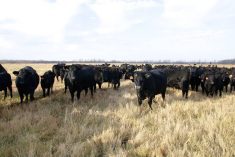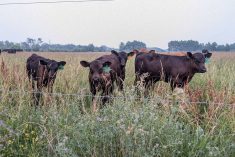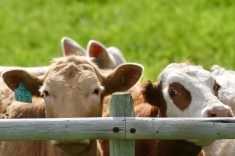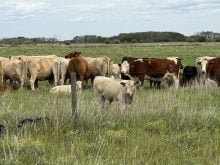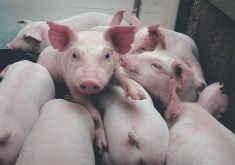VULCAN, Alta. – If the billion dollar health food market disappeared tomorrow Dwayne Smith would continue farming the organic way.
By going back to old-style production the Smith family is practicing sustainable farming and trying to earn a premium price for their work.
“I think what organic farming will do is suggest that there are viable alternatives to the conventional alternatives,” he said.
Dwayne, with his wife, Doreen, and father Russel farm 2,200 acres of chemical-free grain land. They also have a marketing company, Grainworks, to market their grain and other producers’ organic food.
Read Also

Mixed results on new African swine fever vaccine
The new African swine fever vaccine still has issues, but also gave researchers insight into how virus strain impacts protection against the deadly pig disease.
Dwayne chairs the Sustainable Agriculture Association, dedicated to growing food without chemicals. One of its aims is to establish national organic food standards through Agriculture Canada which will widen credibility and marketing opportunities.
Increasing demand
The Smiths think there’s an increasing demand for organically grown food. Consumers have made a lifestyle choice to buy the food despite an increased cost. In the United States about $1.96 billion worth of organic food was sold in 1993. This year sales are expected to be close to $2.8 billion.
The move to organics was motivated by a number of factors including economics. From the time the Smith family settled in the area during the Thirties few chemicals were used, partly because of cost..
The Smiths have been organic farming for less than 10 years. Each year the farm is inspected and certified by the Alberta Sustainable Agriculture Association.
To gain certification the land must be in a transition stage for 36 months to be weaned off chemicals. The goal is to eventually send all their grain to the organic market where a premium is available for certified products. The majority of their production is sold through organic markets. The rest is sold through traditional sources.
“It’s getting easier for us because some things are becoming repetition rather than experimentation. It’s quite frustrating because the system we’ve developed has been mostly trial and error,” said Dwayne.
Calling the farm organic is something of a paradox for the Smiths’ since many of their farming methods are the same ones used by traditional farmers.
Fertility is maintained by seeding sweet clover as a green manure, an inexpensive source of nitrogen. Crops are seeded early to beat the first flush of weeds, and using a rod weeder after seeding keeps other weeds under control.
“If (organic) market gardeners have a weed problem, they go and pull them out. But for 1,200 acres of crop that’s not a very viable alternative. We’re still learning some things and still having to pay for some wrong decisions,” said Dwayne.
Since switching to organic farming the Smiths have noticed a change in the type of weeds. When they used chemicals there was a wide variety of weeds and now they see mostly tansy mustard and stinkweed. To help control weeds, Dwayne rotates the fields between grain and summerfallow to conserve moisture. Summerfallow only receives two or three passes to prevent wind erosion. The extra income and lower herbicide expenses offsets the loss of crop from the summerfallow land.
Improved fields
Dwayne noted some improvement in his fields where marginal land has come back into production. Alkali patches are shrinking and yields are comparable to the neighbors’.
Insects can be a problem with no biological control products registered in Canada for grasshoppers.
Organic farming isn’t the solution to every farmer’s problem. It must be combined with good practical farming practice, said Dwayne.
“A lot of organic farmers are getting by because they’re getting a premium, not because they’re doing a good job farming. I think for an organic system to be sustainable it’s got to be comparable to the normal system as far as bushel per bushel goes.”
At one time Russel exported conventionally grown golden flax to Europe where it went to the health food and pharmaceutical trade. Each year the specifications were tighter with the broker asking for fewer chemicals.
Wandering through a health food store, Dwayne noticed bulk bins full of grain selling for more money than he could earn anywhere else. The family started selling grain to health food stores in Calgary before certification was required.
They grow wheat, flax, durum, and spring and fall rye. With two crops affected by frost, Grainworks has been forced to buy grains from other producers. Through this company they offer 99 chemical-free items including dry beans, lentils and exotic grains purchased from farmers across North America.
Unlike other grain farms with a calmer winter season, the Smiths are busy year round with farm work, selling their crop and pursuing new markets.
Much of the work falls to Dwayne since Doreen works fulltime for the County of Vulcan and Russel is moving toward retirement.
Besides problems in marketing there are other information gaps for organic farmers. New crop varieties aren’t tested under organic conditions and he worries the increased use of hybrid seed which depends on chemical fertilizers could have a tremendous impact on the business they’ve worked so hard to build.




